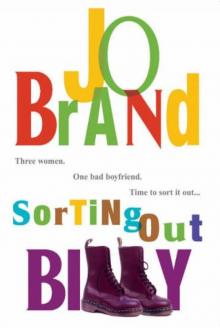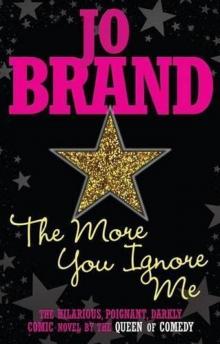Look Back in Hunger Read online
Page 7
Piano lessons became quite an ordeal in some ways. I was not good at practising, despite the fact that I knew she would come down hard on me if I wasn’t up to scratch. So I found myself in the situation of being scared I might be rapped pretty much every week, and this made me not want to play the piano any more. I begged my parents to let me stop and they dug their heels in for a bit until they realised I was very unhappy. I never really told them why.
So, I liked school. I worked hard, I did OK academically and I had really great friends whom I could have a laugh with. There had been whispers that I would do well enough to try for a place at Oxford or Cambridge, and all seemed set fair for a golden few years.
And then everything changed …
CHAPTER SEVEN
TEENAGE KICKS
Towards the end of my fifth year, my parents, owing to my dad’s job, decided to move to Hastings in Sussex. It wasn’t that far from Tunbridge Wells, so I naturally assumed I would continue at the same school and was looking forward to swanning around the sixth-form common room, not having to wear uniform and sailing towards a posh-gob existence at Oxford or Cambridge.
This was not my own idea but one that had been instilled into me by the school, which got a fair few pupils into those august institutions every year. They were always portrayed as the ultimate Valhalla to aspire to, and I didn’t really think seriously about whether I wanted to go there or not, I just assumed I would. This, of course, was encouraged by my mum and dad to a certain extent, as it would have been a great coup for a child of theirs to force her way in through the exclusive portals of what was still pretty much the preserve of the rich and upper classes.
Had my parents had any idea of what was about to happen, they would have happily made any arrangements necessary for me to stay on in Tunbridge Wells, but of course they didn’t, and with me grumpily in tow, trying every trick in the book to be allowed to stay at the same school, they willingly jumped off the precipice of the status quo into a hellhole of appalling teenage behaviour which would test them to the limits of their sanity and beyond.
The main reason I didn’t want to leave Tunbridge Wells was not particularly the school and the teachers, but more the fact that I was very comfortable with the group of friends that I had made and the life I had there. I was, and still am, quite a shy person and I have a horror of rooms full of people I don’t know.
This may, of course, raise a question: ‘Well, what on earth did you become a bloody stand-up comedian for, you dozy cow?’ It’s a fair question and I suppose the only answer I can give is this one.
First of all, I feel that it’s not me up on stage, it’s someone else, a version of me, a confident, cleverer, funnier version of me. Added to that, as a comic clutching your mic, you are allotted some natural authority when you step on stage. You don’t always retain it, but you’ve got it to start off with and that gives you some sense of power.
So, to me, the thought of having to make friends with an entirely new group of people filled me with trepidation.
My mother has always been an immovable object when she makes up her mind about something and although I’m pretty similar, I’ve never been able to match her for stubbornness. I suppose some of my bad behaviour as a teenager was an attempt to lock horns with my parents who, up until that point, had always had the final word.
I started as a pupil at Hastings High School for Girls and decided I wasn’t going to like it. In fact, there were quite a few things not to like about it, one being that some of the teachers were more like characters out of a Dickens novel. One particular teacher, a strange-looking character, had not ended up teaching girls by accident. His personality had two overriding facets to it: grumpiness and perviness. So he would constantly berate us for our shortcomings on the homework front, while simultaneously making completely inappropriate comments about our chests, bums or any other areas he deemed were worth slavering over.
Having a feminist mother (not that she called herself that at the time), I was enormously resentful of any man who divided up women into a series of bits to be assessed and pronounced upon, and found myself getting very angry in his presence, to the point of occasionally nearly losing my temper. But I was a sixteen-year-old schoolgirl and he was a man with the gift of a whiplash tongue that vomited out sarcasm and bile at every given opportunity, and I guess I was just too scared to take him on.
Subconsciously, I think I had decided at that point that I wasn’t going to fit into that school, so I gravitated towards the bad girls in my class and eventually found myself turning up for the register and then on a fairly regular basis leaving school in the car of a friend and going to a café on the seafront where we would spend most of the day smoking and eking out our meagre coins on one or two coffees.
I suppose I bunked off because I never really had any emotional investment in the place. I didn’t particularly like the big, square, modern, ugly block, probably built in the sixties. It would have given Prince Charles a few shivers down the spine, had he ever had the chance to assess the building.
As far as schoolwork was concerned, I knew I was bright enough to hold my own and I hovered around the middle of the class, occasionally slumping towards the bottom. But I didn’t give a toss. The resentment I felt about having been uprooted fuelled my bad behaviour. I didn’t make any effort to get to know the teachers and gave no thought whatsoever to my future in terms of university and work.
Our skiving sessions were pretty uneventful. We went to the same café on the seafront most days and if we did do something different it usually involved mooching round the shops, although this didn’t happen very often, as we were worried we might be spotted by a teacher.
I can really hardly remember a thing about the academic stuff I did at that school. I chose to take French, German, English and Sociology A-levels, although I dropped German after a short while because it was too much. I’d like to think I wasn’t the worst pupil, as someone in our class actually called Wuthering Heights ‘Withering Huts’ on an exam paper.
Sport was a bit of a disaster at this school. I had given up all thoughts of running and jumping due to the humiliation at the hands of the sports teacher at my old school, but I was quite good at throwing things, hence I was chosen to chuck the javelin on sports day.
When that day arrived, as was our habit, several of us disappeared into the toilets to have a quick smoke before the activities began. I pulled out my sad little packet of No. 6 and a box of Swan Vesta, lit the little cigarette and, mindful of not leaving matches lying around, blew the match out and put it back in the box. The problem was that I hadn’t blown the match out properly and when it was deposited in a full box of its companions, the whole bloody box blew up in my hand. Yes, it hurt. It left a huge, blackish-brownish burn on my hand that was really painful. Realising it would not be an easy injury to explain to a first-aid person, I ran cold water over it and wrapped it in a paper towel.
This, of course, meant that throwing the javelin with my right hand, now covered with a huge, weeping burn, wasn’t going to happen, so I went on to the field in the rather ridiculous position of having to throw the javelin with my left hand. Well, of course, it went about three feet, well below the expectations of the watching crowd, completing my general humiliation in the entire range of sports, from running to throwing.
That was the only occasion I think that smoking directly affected my life in an acutely negative way. I had been smoking on and off since I first started taking the school bus to Tunbridge Wells. I remember one of the older kids on the bus had a packet and offered me one, the equivalent of a heroin dealer for school kids. I had always loved the smell of cigarettes. Both my grandma and granddad smoked moderately. Of course, the first puff of a fag makes you realise that they don’t taste like they smell, but even though I didn’t really enjoy it and ending up putting it out after only a few puffs, I ridiculously persevered, probably because my parents were so anti it and part of me wanted to have my own secret little world that had nothing to do with
them.
I would either buy or get someone older to buy ten No. 6 (the common-as-muck fags) from about the age of thirteen and we would smoke them on the bus, blowing the smoke out of the window of the top deck and feeling very pleased with ourselves. When I stayed at my friend Paula’s, in Tunbridge Wells, her mum smoked and we would occasionally nick one of her Benson and Hedges, which we thought were remarkably posh, and blow the smoke out of the bedroom window. I’m sure her mum must have noticed the smell, but she never said anything.
When I got older and was in control of my own destiny and cigarette intake, I chose Rothmans. I’ve no idea why. I remember an ad for them at the time which showed a pilot’s arm at the controls of a plane. The by-line was something like: ‘For the man who is in control.’ No mention of a woman, but I’m sure I subconsciously absorbed the message about being in control.
For maximum sophistication, I would smoke either St Moritz, the menthol cigarettes that had a gold band round them, or Sobranie Cocktails, which were multi-coloured and which we thought made us look interesting, although I’m sure they made us look like pathetic teenagers who wanted to look interesting. The great anti-smoking wave of terror didn’t really hit until the late eighties and early nineties, so you could pretty much smoke everywhere—on planes, in hospitals, in shops and on buses. I think they drew the line at lighting up in church, but I had turned away from all that by then, so I wasn’t too bothered.
Squash was another sport I played at school and, much to my surprise, I became rather good at it (the obvious joke that I squashed people has been made many times over the years). I became school squash champion, perhaps the only tangible success I managed while I was there.
What I loved about squash was that you could hit the ball really hard—it was so satisfying. It’s also rather a sneaky tactical game where you often get the chance to plop the ball gently off a very low part of the wall, thus forcing a rhino-like charge from your opponent all the way across the court to try to return it. On the odd occasion they don’t manage to stop in time and that’s very entertaining. In fact, one of my opponents once knocked out two of his front teeth attempting to return a ball. I felt guilty for weeks.
I remember the girl I played in the final was big and tough but surprisingly nimble on her feet. I think at that time I was about nine stone, so I had the advantage of manoeuvrability. Still, it was a bitterly hard-fought contest. I realised she was getting knackered, so I made her run a lot and eventually I think the poor girl was so exhausted that she just caved in. I don’t know if I even told my parents of my victory. I was no longer seeking their approval or wanting pats on the head from them. It was a bit sad really, but in my mind I rationalised it by convincing myself that they had started it and it was all their fault.
Life moved on, days were spent in the café on the seafront and I gently seethed at home, feeling hard done by that I had been taken away from a school I really loved. I spent a lot of time in my bedroom, reading, writing crap poetry and trying to make the words of the great songwriters fit my life and experience: not easy when most of them were American blokes. I was very resentful and this manifested in as much rebellion as I could manage at home—not a lot because my dad was quite intimidating. Of course, parents keep things from you and I wasn’t aware of how low my father was feeling. He just seemed self-centred and I was wary of his bad temper.
My brother Bill, who was also finding life difficult, took a different tack and just retreated inside himself. He never said much, never smiled and wandered about very quietly as if to say, ‘I don’t want to get involved.’ And who could blame him?
During my first year in the sixth form, while I was still doing German, a German exchange was arranged for those of us attempting A-level. Partners in that far-off land were randomly picked and I ended up with a strapping, rosy-cheeked, extraordinarily unfashionable girl called Bettina who favoured bright-yellow miniskirts, knee-length white socks and prissy little blouses, an ensemble that made her look about ten, except for the fact that her arse was on show.
The whole experience was an ordeal. The family consisted of Bettina, her parents and a rather frightening looking older brother who I kept well away from. On my first day there we celebrated with a glass of something that tasted like burned old tyres. I’m not really sure what it was but I assume it was whisky-based: I was there for a couple of weeks and it just so happened that Hitler’s birthday fell in that period: Much to my surprise, the family informed me in words I barely understood that we were going out to celebrate. We ended up in some kind of pub with a few blokes wandering around in lederhosen and a lot of singing of God knows what sort of songs going on. I was on sieg heil alert, but thankfully it didn’t go that far and after what seemed like twelve hours of backslapping and ‘Tomorrow Belongs To Me’ renditions we finally headed home. I felt like a true outsider, although I gritted my teeth, smiled and tried not to say anything.
I have never held anything against the Germans, however, like some people. Some years into my comedy career, I wrote a column in the Independent which was syndicated to the Mirror, of which Piers Morgan was editor at the time. During Euro 96, England were playing Germany in the semi-final and Paul Gascoigne was depicted on the front page with a German helmet on his head, accompanied by the word ‘Achtung’:
I felt this was just too much anti-German sentiment, particularly as my brother had married a German woman and she had expressed some anxiety about coming over to this country because of it. This was real and not imagined, as some lads had taken to vandalising German makes of car. Their actions were almost completely mindless, but not quite because at least they had learned the difference between foreign cars and English ones.
So I resigned my column in a pathetic sort of protest and subsequently found out over the years that Mr Morgan was unhappy about my resignation. I know this because every time I was in a room with him, be it a green room or a TV studio, he went on and on about it to the assembled crowd: He has since apologised to me. I’ve no idea why. I was surprised because I wasn’t a particularly important person to him. I couldn’t give him a job, couldn’t advance his career. Perhaps he thinks I’m a really wonderful person. Who knows?
Incidentally, while I was in Germany, I was out for a walk on my own and I came across a group of children aged about nine or ten, maybe six or seven of them, actually stoning another child, who was standing completely still and crying. I abhor bullying of any sort and I regret that the compulsion to indulge in it seems to be an essential part of the psyche of many individuals, men and women alike. As I had, despite hours of German lessons, a pretty poor grasp of the language, I hesitated briefly, worrying that they would laugh at me. But the poor little fellow was so distressed, I waded in, shouting in English at them and managing to look fierce enough to scatter them. The problem was, once I’d involved myself, I didn’t know what to do next. I suppose I gave the child a chance to leg it, but my German wasn’t really up to Are you all right? Do you want me to take you home? Where do you live?’ I walked on, thinking cynically that as soon as I had disappeared over the horizon they would probably resume their horrible actions.
I’ve had a few strange encounters with Germans. On holiday in Malta with a friend once, we arrived back at our hotel slightly pissed to find a group of very drunk Germans in the bar, whom you had to pass by to get to the lifts. As we walked past, there was laughter and I caught the word ‘dicke’ which means fat. I was not massive at that time, but not thin either, and having had a few drinks, I felt quite up for a fight. Having a brother married to a German was handy, as I’d picked up a few German phrases, such as ‘Fuck off’ (‘Verpiss dich’ in case you’re interested), so I stalked over, my courage completely drink-fuelled, and threw out the few paltry phrases I knew. The Germans were a combination of amused and shocked and I didn’t hang around to soak up any further reactions—we disappeared into the lift as fast as our slightly drunken legs would carry us.
The next morning I decided to get u
p for an early swim. I don’t subscribe to all that ‘towels by the pool’ nonsense when it comes to Germans, although there were a few members of the group I had berated the night before laid out by the pool, and it really felt like running the gauntlet getting past them. However, I held my head high and marched past as snootily as I could manage and selected a deckchair right at the other end of the pool. I was mightily relieved as my bum headed towards it, until it actually made contact. There was a deafening ripping noise and I continued to descend through the material until my arse made contact with the ground and I found myself sitting in the deckchair rather than on it. The horror. Naturally this scene had been witnessed by the group of Germans who had been my tormentors the previous night. Oh how they laughed, pointed and scrabbled for their cameras. I extracted myself with as much dignity as I could and fled. And I still like Germans.
Bettina’s stay with us on the return part of the exchange was even worse in some ways. She was a pleasant enough person, but our inability to communicate on anything except a very basic level didn’t make it easy for us to have a laugh. I tried not to hold it against her that her parents were out-of-the-closet Nazis, but we did run into some problems. It was nigh impossible to get her to eat anything. She turned her nose up at a whole gamut of English dishes that my mum half desperately, half grumpily placed in front of her and resolutely refused to eat even baked beans, our national dish. What an insult to our culinary skills! It was a difficult few weeks and as the end loomed, I looked towards it with relief.
On Bettina’s last night I planned to take her to Hastings Pier for an evening out, as there was a band on. Having arranged to meet friends there who I knew would laugh at poor Bettina’s sartorial choices, I offered a makeover and a loan of some of my clothes. At that time I was heavily into the hippy side of things, having dallied briefly with skinhead fashion (tonic suit and monkey boots) at my old school. Consequently, I could be found wearing Loon jeans (highly flared cotton ones in a variety of acid-bright colours) and cotton T-shirts with drawstring sleeves. I also eschewed bras, despite the fact that my lovely friend Halcyon’s mum, every time I went round there, tried to pin me down and put one on me with portentous warnings about my chest ending up near my shins in the not-too-distant future.

 Can't Stand Up for Sitting Down
Can't Stand Up for Sitting Down Look Back in Hunger
Look Back in Hunger Sorting Out Billy
Sorting Out Billy The More You Ignore Me
The More You Ignore Me